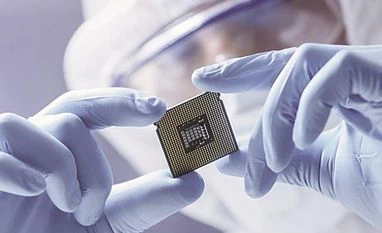The government is considering giving conditional clearance to the Vedanta-Foxconn joint venture semiconductor fab plant. The nod is likely to come with some stiff riders.
“We are considering giving Vedanta-Foxconn conditional clearance and including various riders which they have to fulfill within the stipulated time, such as signing up binding agreements with partners and technology players,” said a government official.
The proposed Vedanta-Foxconn fab plant has come under close scrutiny with many saying that it has still not been able to tie up binding agreements with a manufacturing grade technology provider, one of the key conditions for clearance.
However, the joint venture has been in talks with ST Microelectronics and Global Foundries, according to sources. The government official said that tentative agreements for chip technology have been put in place. A query to Vedanta group on the status of their technology partners did not elicit any response. Both Foxconn and Vedanta do not have any substantial experience or technology to run a fab plant. Foxconn has only recently got into the game by acquiring a small Macronix International chip plant in Taiwan for $90.8 million.
But Foxconn, the largest EMS player in the world, buys over $40 billion worth of semiconductor chips annually for its customers. Some of these could be sourced from its Indian JV chip plant which will give it control over a key component in the supply chain.
Also, Foxconn will require chips as it makes an entry into electric vehicles. It is considering India as one of the destinations for setting up an EV plant.
Foxconn has also shown, in its meetings with government officials, a willingness to set up a second fab plant in the country without any financial support from the government.
Another concern is Vedanta’s financial status. It is struggling to reduce its growing debt burden and some have questioned its ability to raise funds for the fab project.
A total of three players had applied to the government to set up a fab plant last year under the government’s semiconductor scheme which has earmarked $10 billion for financial subsidies.
These included Vedanta-Foxconn, Singapore based consortium IGSS and ISMC, a consortium led by New Orbit which has Israel’s Tower Corporation as its technology and financial partner.
Chipping in
- Neither Foxconn nor Vedanta has substantial experience in fab technology, so they need partners
- JV plans to invest Rs 90,000 crore in the fab plant in Gujarat to make 28 nm chips
- Foxconn buys over $40 billion worth of semiconductors annually for its customers; some of these could be sourced from its Indian JV plant
- Questions have been raised about JV tying up binding pacts with its tech partners; also about Vedanta’s ability to control its debt
However, Tower is being acquired by Intel. Clearance for the acquisition has been postponed owing to geopolitical tensions between the US and China. The latter is a big market for Tower and China has not yet given the go-ahead for Intel’s acquisition of Tower.
Under the Indian semiconductor scheme, the players cleared by the government will be provided 50 per cent of the cost of the project as subsidy, substantially reducing the upfront investment. But the incentives are different from those under the Production Linked Incentive scheme where the financial incentive is given only after incremental sales and investment targets are met each year.
In contrast, the incentives for the fab project are given upfront during the building of the plant. This is why the government has to be extra careful that there are no loose ends. Minister of Communications Ashwini Vaishnaw recently said that the government will announce the first semiconductor project in weeks, though he gave no indication which one it would be.
Vedanta- Foxconn have already announced that they will be setting up the semiconductor plant in Dholera in Gujarat with an investment of Rs 90,000 crore to manufacture 28 nanometers chips, for which there is a large demand in the country.
The Gujarat state government has provided an array of incentives which include a 75 per cent subsidy on the purchase of the first 200 acres of land which later becomes 50 per cent, in addition to a water subsidy and exemption from paying for electricity.
Unlock 30+ premium stories daily hand-picked by our editors, across devices on browser and app.
Pick your 5 favourite companies, get a daily email with all news updates on them.
Full access to our intuitive epaper - clip, save, share articles from any device; newspaper archives from 2006.
Preferential invites to Business Standard events.
Curated newsletters on markets, personal finance, policy & politics, start-ups, technology, and more.
)